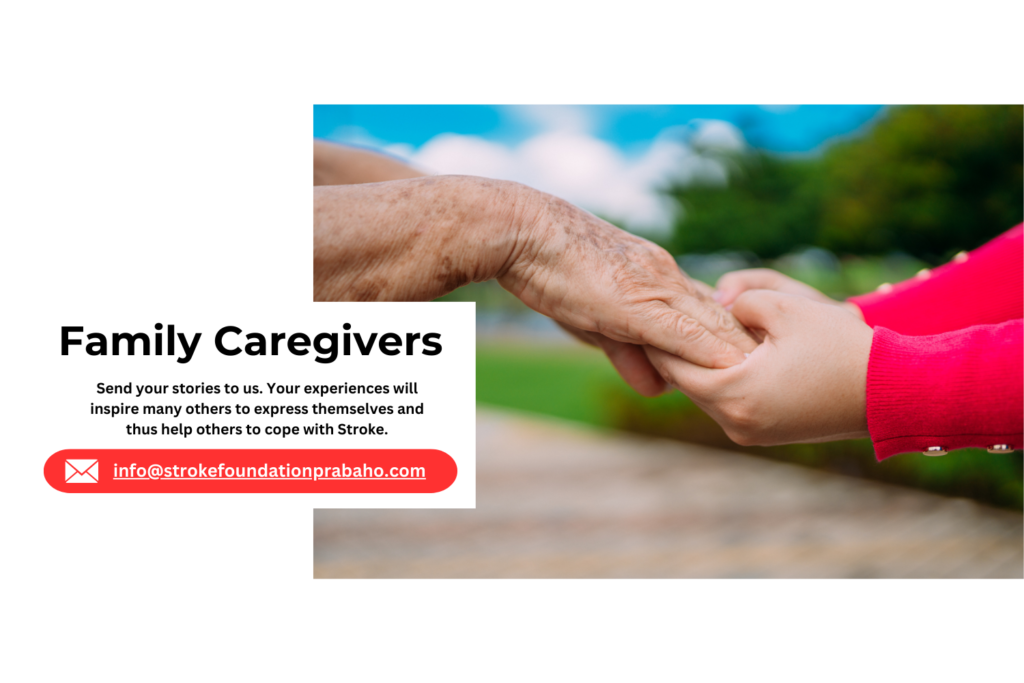Stroke Care

Care with Love
Anupama Shared Her Story With Us
One who CARES cannot simply be tagged as a “caregiver.” They are those who relentlessly CARE for their near and dear ones at home with love. I speak for all the family members facing challenges day in and out, yearning to restore a stroke survivor to a semblance of their pre-stroke self.
The burden of stroke is increasing in India and is the fifth leading cause of disability according a Publication by NCBI in 2021.
In some cases when you see a once-vibrant individual suddenly paralysed on one side, face contorted, mobility and memory slipping away within moments, it has devastating effect on their family members too.
The urgent directives from doctors to rush the patient to the hospital leave families bewildered and helpless.
Their minds are flooded with questions and expecting replies from attending doctors. Yet, dedicated neurologists focus solely on administering critical emergency care.
Later on as doctors explain about the diagnosis, course of treatment and later the role of stroke survivor’s family members, they realise their consequential responsibilities. The patient returns home, laden with therapy and training requirements viz Physiotherapy, Speech Therapy, Toilet Training etc.
Without formal training, family members find themselves administering medicines, bathing, feeding and managing various facets of care which requires very precise levels of expertise.
For many, hiring professional nurses for extended periods becomes financially unfeasible. In many cases the breadwinner, becomes incapacitated with loss of their source of income. In cases where the family unit is reduced to just two individuals with no children or additional support, the burden becomes truly overwhelming.
Balancing the demanding role of a CARE giver with the relentless financial strain of medical expenses and daily living costs pushes families to their limits. Unforeseen challenges test one’s resilience and resourcefulness.
We provide CARE with love, yet our lives undergo a dramatic transformation. Slowly, we slip into a solitary existence, with dwindling social connections and limited understanding from acquaintances. Loneliness creeps in, compounded by the weight of decision-making without a support network.
Physical exhaustion, mental strain, sleep deprivation, and loss of self-identity culminate in feelings of despair and frustration. The empathy and compassion required to attend to a loved one in need, often comes at the expense of one’s own well-being. The person is left with hardly any time or will to attend to oneself.
Despite these tribulations, caregivers soldier on, motivated by love and unwavering hope. At times some CARE givers even have resentment about bad moods that affect while caring for the helpless sick dependent lying in bed.Yet brushing all negativity aside they endeavour very positively to CARE for their loved ones sacrificing their own peace of mind in the process. Their unyielding determination stems from the belief that their efforts provide solace to those in their care.
I too, have navigated this arduous journey silently. At the age of 62, my husband suffered a stroke, leaving him bedridden. For 13 years, I have confronted every hardship head-on, grappling with moments of desperation and anguish. However, I draw strength from within, pushing myself to enhance the quality of care I provide, seeking solace in the belief that my resilience benefits us both.
I keep my identity hidden only so that no one sympathises me on my condition though empathy is always welcome.
Amidst the adversities, I had the support of a friend, a doctor who remained steadfast during my darkest hours.
It’s really a matter of pride that Indian Stroke Association is organising a conference of such magnitude on Stroke in Kolkata. Neurology continues to advance rapidly, expecting a glimmer of hope for caregivers worldwide. A future where post-stroke CARE givers find respite and support hope is on the horizon.
We, the non medicos and general public should be made aware of what is a BRAIN STROKE. People still cannot differentiate between a Heart Attack and a Brain Attack. Less than one in four people are aware of the symptom of BRAIN STROKE, which affects 1.8 million Indians according to a national survey unto my knowledge.
My appeal to all National, International Neurologists, NGOs to contribute their thoughts on propagating knowledge to educate the common man on Brain Stroke Awareness.
I remain steadfast in commitment to care with compassion and love, embracing the challenges with unwavering fortitude.
